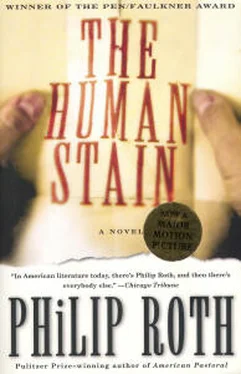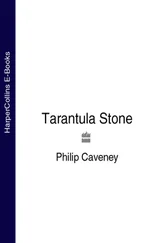The Human Stain
by
Philip Roth
OEDIPUS: What is the rite of purification? How shall it be done?
CREON: By banishing a man, or expiation of blood by blood...
—Sophocles, Oedipus the King
IT WAS in the summer of 1998 that my neighbor Coleman Silk — who, before retiring two years earlier, had been a classics professor at nearby Athena College for some twenty-odd years as well as serving for sixteen more as the dean of faculty — confided to me that, at the age of seventy-one, he was having an affair with a thirty-four-year-old cleaning woman who worked down at the college. Twice a week she also cleaned the rural post office, a small gray clapboard shack that looked as if it might have sheltered an Okie family from the winds of the Dust Bowl back in the 1930s and that, sitting alone and forlorn across from the gas station and the general store, flies its American flag at the junction of the two roads that mark the commercial center of this mountainside town.
Coleman had first seen the woman mopping the post office floor when he went around late one day, a few minutes before closing time, to get his mail — a thin, tall, angular woman with graying blond hair yanked back into a ponytail and the kind of severely sculpted features customarily associated with the church-ruled, hardworking goodwives who suffered through New England's harsh beginnings, stern colonial women locked up within the reigning morality and obedient to it. Her name was Faunia Farley, and whatever miseries she endured she kept concealed behind one of those inexpressive bone faces that hide nothing and bespeak an immense loneliness. Faunia lived in a room at a local dairy farm where she helped with the milking in order to pay her rent. She'd had two years of high school education.
The summer that Coleman took me into his confidence about Faunia Farley and their secret was the summer, fittingly enough, that Bill Clinton's secret emerged in every last mortifying detail — every last lifelike detail, the livingness, like the mortification, exuded by the pungency of the specific data. We hadn't had a season like it since somebody stumbled upon the new Miss America nude in an old issue of Penthouse, pictures of her elegantly posed on her knees and on her back that forced the shamed young woman to relinquish her crown and go on to become a huge pop star. Ninety-eight in New England was a summer of exquisite warmth and sunshine, in baseball a summer of mythical battle between a home-run god who was white and a home-run god who was brown, and in America the summer of an enormous piety binge, a purity binge, when terrorism — which had replaced communism as the prevailing threat to the country's security — was succeeded by cocksucking, and a virile, youthful middle-aged president and a brash, smitten twenty-one-year-old employee carrying on in the Oval Office like two teenage kids in a parking lot revived America's oldest communal passion, historically perhaps its most treacherous and subversive pleasure: the ecstasy of sanctimony. In the Congress, in the press, and on the networks, the righteous grandstanding creeps, crazy to blame, deplore, and punish, were everywhere out moralizing to beat the band: all of them in a calculated frenzy with what Hawthorne (who, in the 1860s, lived not many miles from my door) identified in the incipient country of long ago as “the persecuting spirit”; all of them eager to enact the astringent rituals of purification that would excise the erection from the executive branch, thereby making things cozy and safe enough for Senator Lieberman's ten-year-old daughter to watch TV with her embarrassed daddy again. No, if you haven't lived through 1998, you don't know what sanctimony is. The syndicated conservative newspaper columnist William F. Buckley wrote, “When Abelard did it, it was possible to prevent its happening again,” insinuating that the president's malfeasance — what Buckley elsewhere called Clinton's “incontinent carnality”—might best be remedied with nothing so bloodless as impeachment but, rather, by the twelfth-century punishment meted out to Canon Abelard by the knife-wielding associates of Abelard's ecclesiastical colleague, Canon Fulbert, for Abelard's secret seduction of and marriage to Fulbert's niece, the virgin Heloise. Unlike Khomeini's fatwa condemning to death Salman Rushdie, Buckley's wistful longing for the corrective retribution of castration carried with it no financial incentive for any prospective perpetrator. It was prompted by a spirit no less exacting than the ayatollah's, however, and in behalf of no less exalted ideals.
It was the summer in America when the nausea returned, when the joking didn't stop, when the speculation and the theorizing and the hyperbole didn't stop, when the moral obligation to explain to one's children about adult life was abrogated in favor of maintaining in them every illusion about adult life, when the smallness of people was simply crushing, when some kind of demon had been unleashed in the nation and, on both sides, people wondered “Why are we so crazy?,” when men and women alike, upon awakening in the morning, discovered that during the night, in a state of sleep that transported them beyond envy or loathing, they had dreamed of the brazenness of Bill Clinton. I myself dreamed of a mammoth banner, draped dadaistically like a Christo wrapping from one end of the White House to the other and bearing the legend A HUMAN BEING LIVES HERE. It was the summer when — for the billionth time — the jumble, the mayhem, the mess proved itself more subtle than this one's ideology and that one's morality. It was the summer when a president's penis was on everyone's mind, and life, in all its shameless impurity, once again confounded America.
Sometimes on a Saturday, Coleman Silk would give me a ring and invite me to drive over from my side of the mountain after dinner to listen to music, or to play, for a penny a point, a little gin rummy, or to sit in his living room for a couple of hours and sip some cognac and help him get through what was always for him the worst night of the week. By the summer of 1998, he had been alone up here — alone in the large old white clapboard house where he'd raised four children with his wife, Iris — for close to two years, ever since Iris suffered a stroke and died overnight while he was in the midst of battling with the college over a charge of racism brought against him by two students in one of his classes.
Coleman had by then been at Athena almost all his academic life, an outgoing, sharp-witted, forcefully smooth big-city charmer, something of a warrior, something of an operator, hardly the prototypical pedantic professor of Latin and Greek (as witness the Conversational Greek and Latin Club that he started, heretically, as a young instructor). His venerable survey course in ancient Greek literature in translation — known as GHM, for Gods, Heroes, and Myth — was popular with students precisely because of everything direct, frank, and unacademically forceful in his comportment. “You know how European literature begins?” he'd ask, after having taken the roll at the first class meeting. “With a quarrel. All of European literature springs from a fight.” And then he picked up his copy of The Iliad and read to the class the opening lines. “‘Divine Muse, sing of the ruinous wrath of Achilles ... Begin where they first quarreled, Agamemnon the King of men, and great Achilles.’ And what are they quarreling about, these two violent, mighty souls? It's as basic as a barroom brawl. They are quarreling over a woman. A girl, really. A girl stolen from her father. A girl abducted in a war. Mia kouri —that is how she is described in the poem.
Читать дальше












